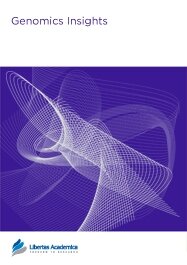

Publication Date: 30 Jan 2012
Type: Original Research
Journal: Genomics Insights
Citation: Genomics Insights 2012:5 1-12
doi: 10.4137/GEI.S9125

Background: Methacholine challenge is commonly used within the asthma diagnostic algorithm. Methacholine challenge has recently been shown to induce airway remodelling in asthma via bronchoconstriction, without additional airway inflammation. We evaluated the effect of methacholine-induced bronchoconstriction on the peripheral whole-blood transcriptome.
Methods: Fourteen males with adult-onset, occupational asthma, 26–77 years of age, underwent methacholine inhalation challenges. The concentration of methacholine eliciting a $20% fall in FEV1 (PC20) was determined. Blood was collected immediately prior to and two hours after challenge. Complete blood counts and leukocyte differentials were obtained. Transcriptome analysis was performed using Affymetrix GeneChip® Human Gene 1.0 ST arrays. Data were analyzed using robust LIMMA and SAM. The cell-specific Significance Analysis of Microarrays (csSAM) algorithm was used to deconvolute the gene expression data according to cell type.
Results: Microarray pathway analysis indicated that inflammatory processes were differentially affected. CsSAM identified 1,559 transcripts differentially expressed (all down-regulated) between pre- and post-methacholine in eosinophils at a false discovery cutoff of 10%. Notable changes included the GOLGA5 and METTL2B genes and the protein ubiquitination and CCR3 pathways.
Conclusions: We demonstrated significant changes in the peripheral blood eosinophil-specific transcriptome of asthmatics two hours after methacholine challenge. CCR3 and protein ubiquitination pathways are both significantly down-regulated.
PDF (3.82 MB PDF FORMAT)
RIS citation (ENDNOTE, REFERENCE MANAGER, PROCITE, REFWORKS)
Supplementary Files 1 (201.64 KB ZIP FORMAT)
BibTex citation (BIBDESK, LATEX)

Recently we published a paper describing cloning of a new kinase gene, MLK4, in Genomics Insights. I was impressed by the prompt processing and speed of publication. The comments from the reviewers allowed me to improve the paper significantly. The reviews were scientifically deep and objective, which is very valuable because in many journals decisions to publish or not to publish are very unfair and subjective. I highly recommend that other ...
Facebook Google+ Twitter
Pinterest Tumblr YouTube